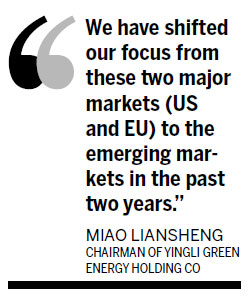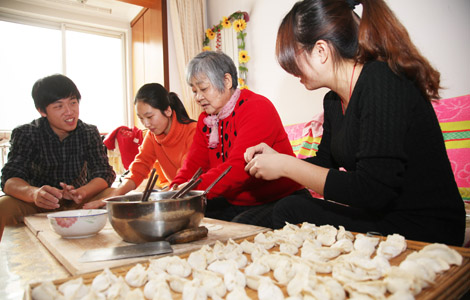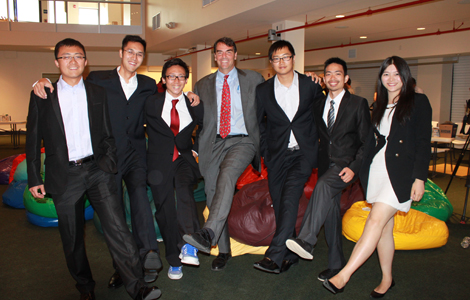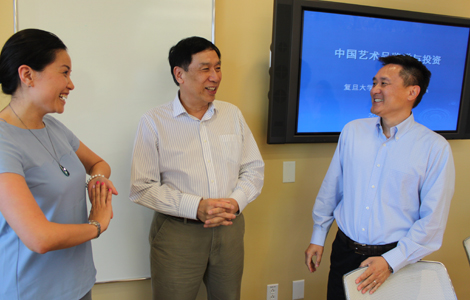Bright view for Yingli as it eyes new economies
Updated: 2013-08-06 06:47
By Zheng Jinran in Baoding, Hebei (China Daily)
|
||||||||

Hebei province-based Yingli Green Energy Holding Co, the world's biggest maker of solar panels by capacity, is shifting its focus to emerging economies and other new markets. It is also providing downsteam services to diversify its development.
"The downturn of an industry is inevitable, just like the chilly winter comes after a fruitful fall. It's a cycle of development," said Miao Liansheng, chairman and chief executive officer.
Miao said that the challenges facing Yingli and its industry counterparts had exposed production and managerial problems that needed to be solved.
Despite the industry turmoil, the 57-year-old entrepreneur believes conditions will stabilize. It's the same kind of confidence that helped him in 1998, when he shifted from cosmetics to become a pioneer solar panel manufacturer.
Chinese solar panel production quadrupled between 2009 and 2011 to more than the rest of the world put together.
That surge helped lead to anti-dumping actions by the European Union and United States, the top two overseas markets for the Chinese industry.
In 2013, the total quantity of Yingli's photovoltaic products will reach 3.2 to 3.3 gigawatts, an increase of at least 39.4 percent, the group has forecast.
"We have shifted our focus from these two major markets to the emerging markets in the past two years to reduce the risk from punitive duties and maintain stable development," he said.
Sales to the EU accounted for 62 percent of the group's total in 2012. But shipments there are down sharply this year.
In the first quarter, the figure was 54 percent. The full-year figure will decline to 38 percent, compared with 80 percent in 2010, the sales peak for the EU.
Yingli is striving to increase sales in new markets such as Japan, India, Malaysia and Jordan and various African countries.
Total shipments to these markets are forecast to increase from 1.7 percent in 2010 to 23.1 percent in 2013.
In June, the group received an order from South Africa for 96 mW of capacity and another for 10 mW from Amcorp Power of Malaysia in April. It also achieved its first deal with Jordan in February, which could be for as much as 65 mW.
"We use local talent to manage the branches and we've adopted the advantage management system, which allows us to give them orders adjusted to the local situation and to administer the operations remotely," Miao said. The group has set up 17 branches on several continents.
Downstream services
The large domestic market is another focus of the group this year. "We will maintain our market share in China, making it a stable part of sales," Miao said.
The State Council released guidelines for the battered industry on June 14 that were based on six principles for the healthy development of solar energy, including subsidies, grid access and financing.
It also said that new installed capacity would reach 10 mW annually from 2013 to 2015.
For the past two years, the domestic market has accounted for about 24 percent of group sales for Yingli.
To maintain its growth, the company has formulated a development strategy: 30 percent of sales are to come from products used for surface power stations, another 30 percent from roof-top units and the remaining 40 percent from distributed equipment, such as solar power units in individual residences.
"Units for individual companies and households will drive our development," Miao said.
He added that the subsidies for solar power, which are about 0.42 yuan (7 cents) per kilowatt, will be a huge motivation for them to buy and generate electricity.
Further, as early as 2014, customers will be able to buy solar panels from a wide range of retail distributors, instead of just a few outlets, and install the units themselves. Yingli has already used this approach in Spain as a pilot project.
The group will also cooperate with the Qujing government in Yunnan province to build photovoltaic power stations in the barren mountains and slopes between 2013 and 2016, installing more than 3 gigawatts of capacity.
- Cloud lifts on solar panels
- EU, China solve solar panel dispute
- Price deal to keep Chinese solar panels in EU
- China, EU reach deal on solar panel dispute
- A growing rift on solar panels
- Talks taking place with EU over solar panel exports
- The solar-panel ball is in the EU's court
- Jiangxi promotes solar panel installation for residents' homes

 First taste of test-tube burger close to meat
First taste of test-tube burger close to meat
 Govt urged to take care of parents who lose child
Govt urged to take care of parents who lose child
 1 dead, dozens injured in Urumqi bus fire
1 dead, dozens injured in Urumqi bus fire
 Lei Feng's African brother
Lei Feng's African brother
 EU SMEs target niche markets in China
EU SMEs target niche markets in China
 British couple caring for special children
British couple caring for special children
 Fly for adventure at US air show
Fly for adventure at US air show
 Kobe Byrant meets fans in Shenzhen
Kobe Byrant meets fans in Shenzhen
Most Viewed
Editor's Picks

|

|

|

|

|

|
Today's Top News
Drifting left, Asian American voters still back John Liu
Beijing sincere on S China Sea Code of Conduct
Washington Post sold to Amazon's founder
Fonterra says sorry for 'anxiety'
Obesity rate on the increase
Detroit Symphony brings China to NYC
Service sector drives up growth
Globalization of Chinese culture becomes hot topic
US Weekly

|

|





